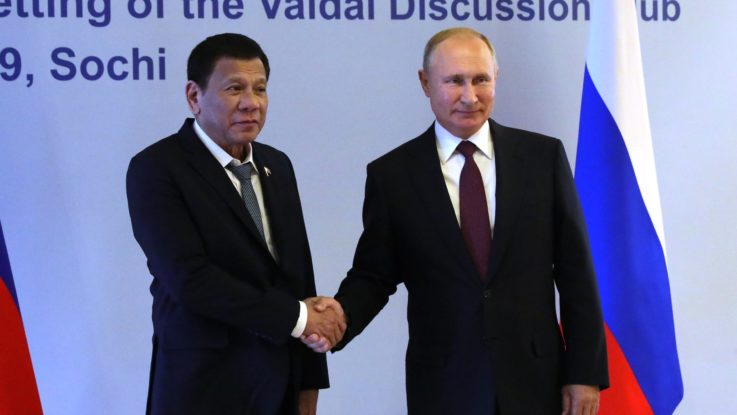The Flirtation Between Manila and Moscow is a Sign of the Times

I’ve got a newish, short piece up at the website for Exit from Hegemony. As is my wont, I’m cross-posting it here.
In The National Interest, Richard Javad Heydarian writes that:
For the first time in its history, Manila is seeking Russian assistance to upgrade its defensive capabilities and, potentially, even develop its energy resources in the South China Sea. To put things into perspective, the newfound Philippine-Russia rapprochement is not only the reflection of an outright ‘bromance’ between two of the most prominent authoritarian leaders, which could fizzle out over the years and political cycles. But it also represents a potential hedge against China’s encroachment into Philippine waters. In a remarkable twist of events, an American ally is seeking post-Soviet Russia’s assistance to stave off communist China. And it took a surreal combination of strategic boldness and pure opportunism on the part of Duterte and Putin to make this happen.
What accounts for the flirtation between Philippines President Rodgrio Duterte and Russian President Vladmir Putin?
The Filipino president, however, is likely Putin’s most enthusiastic protégé, who has repeatedly cussed at the West’s supposed interference in his affairs. No wonder, Duterte is likely attracted to Putin’s ideology of “sovereign democracy” (suverennaya demokratiya), which, according to veteran Russian propagandist Vladislav Surko, denotes a regime whereby a “society’s political life…the political powers, their authorities, and decisions are decided and controlled by…the people that formed it.” As the longtime Putin advisor put it, a nation is democratic in so far as it’s insulated from external meddling, especially from Western powers. Notorious for his arbitrary decision-making and apocalyptic rhetoric, Duterte’s politics also closely resemble the views of Putin’s state philosopher, Ivan Ilyin, who argued in favor of a savior-leader that rules based on “redemptive excess” and “patriotic arbitrariness.”
In Chapter 5 of Exit from Hegemony, we devote space to charting the evolution of the Duterte regime along with those of two other increasingly illiberal leaders, Hungary’s Viktor Orbán and Turkey’s Recep Tayyip Erdoğan. All three cases showcase how the availability of alternative patrons and alternative models have facilitated democratic backsliding.
Such current flirtations with Russia—and, to a lesser degree, China—haven’t produced an actual break from the American hegemonic system. Hungary and Turkey are still NATO members. The Philippines remains a host for US forces and a recipient of American military aid. But it has complicated Washington’s ability to exert leverage over all three countries.
Moreover, railing against liberal norms and western pressure provides a way for leaders such as Duterte to ‘show strength.’ This helps explain the convergence on similar rhetoric found among contemporary illiberal leaders. As we argue in the book:
Multipolar populists publicly reject liberal elements of international order for the same reasons that they appeal to illiberal principles domestically—they argue that the rules, norms, and institutions of liberal order impose unnecessary constraints on their regimes and place conditions on their sovereignty that reflect alien interests and influences. In turn, all these leaders have turned toward authoritarian power as either possible or actual alternative patrons, while invoking them as models for their regimes. They therefore publicly portray breaking free from the constraints of liberalism as a means of upholding national self-determination; they dismiss external criticism of their democratic backsliding as attacks on national sovereignty.
Current trends, then, suggest that we will see more of this kind of thing as leaders look for ways to buttress their regimes and enhance their populist bonafides.
